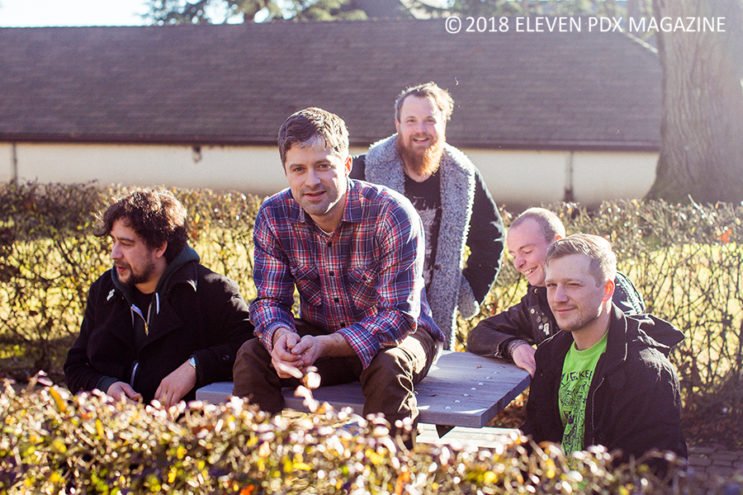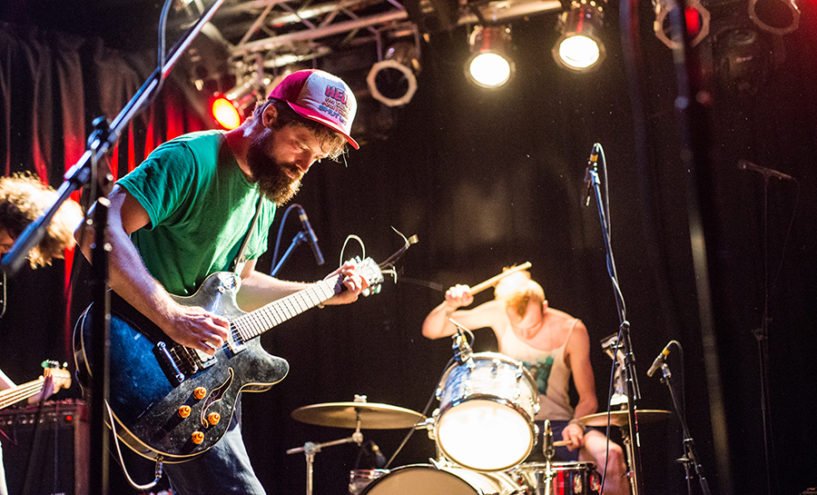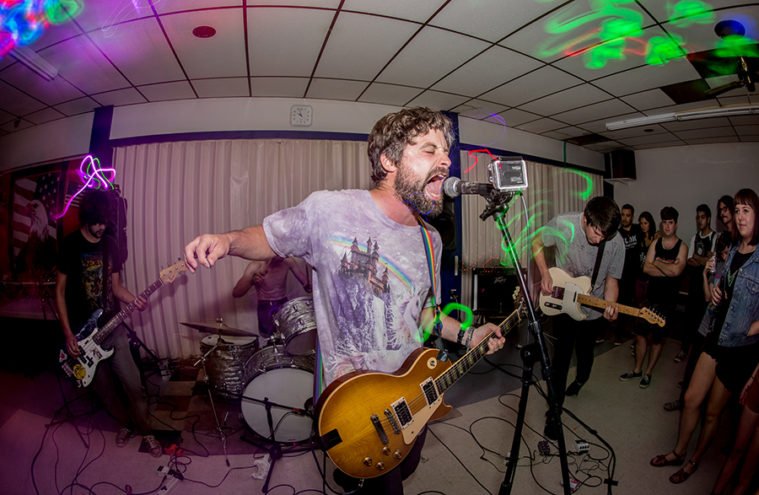And And And


Live in Portland February 16, 2018 | Doug Fir
Bim Ditson tells me over coffee at my place that the internet is a conscious entity whose needs and desires do not align with our own. I’m unsure how seriously to take the band’s convictions. You can hear them carefully narrated over their latest spotify single, “Bragi.” It’s not so much a song as a manifesto detailing why the band’s new music will no longer appear on streaming platforms. Anyway, the next evening I heard Bill Nye float the idea, or at least its unknowability, of an internet superconsciousness on his new show. So who’s to say?
To hear And And And’s powerful new full-length LP, Idiot (out February 13), you’ll need to get thee to their website or buy a hard copy. The lyrics are bleak, philosophical and––when delivered by the strained voice of Nathan Baumgartner––punk AF. The music itself is tougher to pigeonhole. The band attests their sound is the result of their long friendship and their individual tastes, which cover a broad spectrum.
ELEVEN: Bim, let’s talk about Rigsketball.
Bim Ditson: It started when I bought a basketball hoop at Goodwill and I was gonna bolt it to the side of my house. But Berg convinced me that was a bad idea, as I am a renter. Then he and I put it on the van, like really shitty, not regulation height or anything. Then that got knocked off, so I put it back on, made it regulation height and then we started challenging other bands. I think we first played against Archers when we were playing a show with them, and it just sort of ballooned into a thing that I can’t seem to reign back.
11: Who’s won the tournament in the past?
BD: The Rock and Roll Soldiers won the first year.
11: And is Treefort where it always happens in full?
BD: No, it happens in full here in the summer. Here it’s a 32-band bracketed tournament. Single elimination. And then at Treefort it’s usually just one-offs because everybody is too busy to be coming back for games after. So there it’s usually 20, 24 bands that play.
11: Is this band good at basketball?
[ALL]: No.
11: Is there a good player in the band?
Ryan Wiggins: Nate used to play in high school, right?
Nathan Baumgartner: I played in middle school.
Berg Radin: You jump really high though.
RW: Nathan can jump.
NB: I can only dribble to the right. After about five minutes they’re like, “Okay, we know what this guy can do and we’re just gonna guard against that.” And they defeat me every time.
RW: We have good games, but we’re not good basketball players.

11: Your new single “Bragi” talks about Internet Consciousness, can you give our readers a dumbed-down version of this?
BD: It’s hard to do a version that’s not nuanced because it’s a big, complex thing. But for me personally, I don’t see any reason why the internet wouldn’t already be conscious and have its own reasons for self-preservation. It doesn’t seem like it has much regard for us. It also doesn’t seem like we have an effective parallel to the Turing test for this kind of consciousness.
11: We already have AI that’s passed the Turing test.
BD: Yeah and the thing is AI that passes a Turing test is AI that we can understand. The question is, if something became conscious that was beyond us, how would we even know that it’s existing?
11: The Skynet level.
NB: And in the end, how has it helped us? It has to a degree, but….
BD: I think that’s where a lot of the nuance comes in because it’s like, with any powerful thing, it’s going to create all this good. And if it’s really powerful it’s going to be effective at obscuring the bad that it does. That’s a concern of mine. That’s a difficult thing to make simple because it’s not.
11: And people are seeing more and more of their same opinion or their taste in music reflected back to them as the data gets collected.
BD: Yeah. And I think data-driven arts are not arts. Like data as a backwards looking tool for projecting business results is useful, but it’s not good for creativity. I don’t think it makes sense for people who want to make something novel and new to just be looking at numbers.
11: Understood. What’s the labor of running your band like?
Jonathan Sallas: It’s tight. You do whatever.
BD: Work can be obscured as an idea into something that’s bad, rather than work being something that’s good and fun and collaborative and explorative. And that’s how it feels to us to be able to just do stuff and not be so driven by results and more driven by what we’re stoked on. That’s part of the whole idea of self-releasing, and doing our own distribution, and we do all our videos, and we built our own practice space because we were sick of paying rent at practice spaces. There’s a million different little things to being a band. There’s a lot of learning that happens, but at the same time we find some things that we never would have stumbled on if we were relying on somebody else to make those decisions and tell us what we’re supposed to do.
11: Are there, formally or informally, different roles among you all when it comes to the non-music parts or engineering?
NB: Well, Bim essentially manages the band.
BD: If you were to give it a term, it would be that.
RW: As far as engineering, the only person who’s worked on the album besides us…
NB: Jeff. Jeff Bond is our friend who recorded it.
BR: Mindfreak audio.
11: Is that Jeff’s thing?
RW: We kind of named it for him.
NB: Yeah, we named it for him.
BD: For the record his studio is called MINDFREAK AUDIO.
RW: All caps.
JS: And all the art for the album is made by our friend in town, Magical.
11: The cover sort of looks like God with his hand cut off squeezing a human being and maybe losing control of the world?
NB: The theme of the album is that there’s more to reality than what you can perceive. And there’s some themes about creation and original sin and the idea that God is sort of ambivalent to us. We’re searching for something, and the God character looks just looks vacant.
11: With like four eye sockets?
NB: He’s got three, and they’re all off center. He does not look wise or smart.
11: And it’s called Idiot?
NB: Yeah. Idiot. So it’s about different levels of being an idiot. Like God could be all powerful and he’s holding the philosopher’s stone, but his hand is detached because he still can’t quite reach it. No matter how hard you’re reaching for understanding you will never grasp it and neither will God, and there’s something bigger than him too. And meanwhile we’re in his grasp and he does not care. We talked with Magical about it.
11: You’ve got this line: “To feed the flesh of the king to the ones he ignores.” Is this still in the theological realm?
NB: That’s all anti-government stuff… just socialist shit.

11: I’m wondering if there’s anything about either a band member’s biography or the band’s biography that would help people appreciate the new album more.
BD: I’m of the mind that we’ve gotten a little too interested in biography and a little bit less interested in music as a culture.
NB: As far as a band dynamic goes, I think what might set us apart is we’re all really long time friends. Me and Ryan and John went to elementary school together.
BD: I met them when they were in college and my band played a house show with them.
NB: He was like 15.
BD: To be explicit about the function of the group too… this band doesn’t exist without this set of people. We don’t get a new guitarist every three months, it’s very much these specific people because we all want to be in this band because we are close friends. We don’t want to make a band that’s a mythos so Nathan can play with session players.
NB: I’m not driven enough to do that. I need everyone to be like “Alright, this is what you do Nathan.” Everyone’s holding my hand. If I didn’t have this band I probably wouldn’t be doing music even. Well, I guess I would but it wouldn’t be listened to or heard. It wouldn’t be anything.




